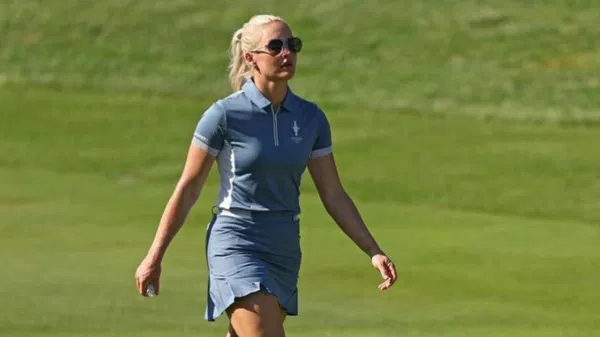
Charley Hull Warns Fans About Social Media Scams—Again
In today’s digital world, the idea of becoming a social media influencer is a dream for many. The allure of fame, luxury, and widespread recognition makes it an attractive prospect. However, this online presence comes with significant risks, including impersonators, scammers, and fraudulent accounts. Even established figures like professional golfer Charley Hull are not immune to such threats. Recently, she once again had to warn her fans about fake profiles using her name to deceive people—a situation she has faced multiple times before.
A Recurring Problem for Hull

In 2023, Hull exposed a case where an unauthorized TikTok account was using her pictures, despite her never having created an account on the platform. Then, in December of the same year, she addressed her followers with a strong message urging them to stay vigilant. Though she did not provide specific details about what triggered her warning, she acknowledged the presence of multiple fake accounts falsely claiming to be her. These scammers had been approaching her fans, asking for money or gift cards in exchange for promises of a “meet & greet” or a “fan club membership.”
This type of fraud is not new in the sports world. Another well-known golfer, Paige Spiranac, has spoken extensively about similar scams targeting fans. Hull made it clear that she would never request money or gifts in exchange for any kind of fan interaction. In her statement, she emphasized that she and her team only communicate through her official social media handles: @charley.hull on Instagram and @hullcharley on X (formerly Twitter). She also stressed that she does not have a TikTok account and warned her followers against engaging with any profiles claiming to be her.
Hull’s message to her fans was direct: “I will never ask for money or gift cards in exchange for meet & greets or fan club membership. These clubs are fake and run by scammers. My team and I only use my official social media accounts, @charley.hull (Instagram) and @hullcharley (X) at ALL times, there are no exceptions. I am not on TikTok. There are SO many fake accounts out there claiming to be me. If you are contacted by them, please report it. Let’s all stick together so we can beat the scammers.”
Another Warning After the Founders Cup
Despite her previous cautions, Hull found herself in the same situation once again just two months later. Shortly after finishing T19 in the Founders Cup at Bradenton, she took to Instagram to issue another urgent warning to her followers. On her Instagram story, she stated, “I DON’T HAVE TELEGRAM, or any other Instagram page, Facebook page, or any private chats! So if you think you are talking to me, you are NOT! There are so many fake accounts and scammers around, please do not be fooled!”
The fact that Hull had to repeat her warning suggests that another scam had surfaced during the tournament, prompting her to take immediate action. She even reposted her previous cautionary statement, reinforcing her message and urging fans to stay alert.
Other Golf Stars Face Similar Issues
Hull is far from the only golfer dealing with impersonation scams. Even top-ranked players like Nelly Korda have encountered the same issue. Recently, Korda also addressed her followers about scammers using her name to deceive people. She reassured her fans that she would never ask them for money and encouraged them to report suspicious activity.
Korda made it clear that she only uses her verified social media accounts: @nellykorda on Instagram and X. She also stated that she does not have a TikTok account, just as Hull had mentioned in her warnings.
Another prominent golfer, Jin Young Ko, has also spoken out about fake accounts using her identity. She advised her fans to engage only with verified accounts that have the official blue checkmark.
This issue extends beyond individual athletes. Even major brands, such as Callaway, have been targeted by online scammers offering fake giveaways in exchange for money.
The Bigger Question: Are Social Media Platforms Doing Enough?
The growing number of impersonation cases raises an important question: are social media companies doing enough to protect athletes and public figures from scammers? Despite verification tools and reporting systems, fraudulent accounts continue to appear, tricking unsuspecting fans.
This ongoing issue has sparked debates about whether platforms like Instagram, X, and Facebook should take stronger measures to prevent such scams. Some argue that it is up to the athletes themselves to monitor and report fake accounts, while others believe that these platforms should be held more accountable for user safety.
Regardless of where the responsibility lies, one thing is clear: scams and impersonations remain a serious problem for high-profile athletes, and fans need to be cautious when interacting with online accounts claiming to be their favorite sports stars.